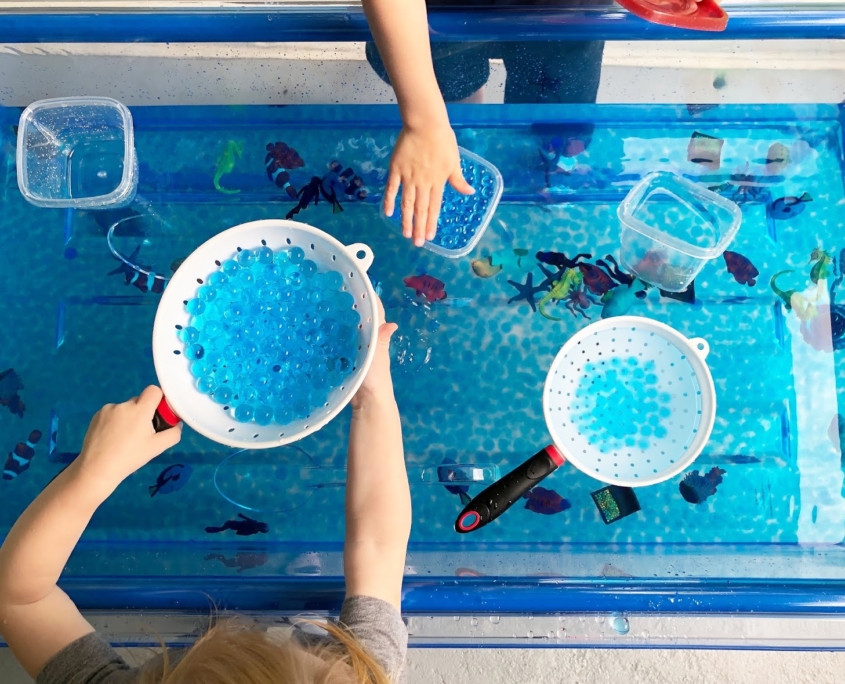How Water Play Supports Sensory Development in Young Children

Water play is more than just splashing and having fun—it is an important part of learning and growing in the early years. At WeKidz Early Learning Centre, we encourage children to explore activities like water play because it supports both their sensory and cognitive development. Families looking for “childcare near me” often seek environments where play and learning are combined, and water play is a perfect example of this.
When Can Children Start Water Play?
Children can begin simple water play from around 6 months of age, once they can sit with support. At this age, water play may be as gentle as splashing in a shallow tray with a parent close by. As they grow into toddlers and preschoolers, the activities become more interactive—such as pouring from cups, experimenting with floating objects, or even simply pretending to play with boats and animals. Each stage introduces new growth opportunities and connects directly to their developmental needs.
Why Sensory Development Matters
Sensory development helps children understand and respond to the world around them. It involves using touch, sight, hearing, smell, and taste to build connections in the brain. At a trusted Early Learning Centre in Glebe, children are given opportunities to explore these senses in a safe and engaging way. Water play is one of the most effective activities for this because it combines movement, texture, and creativity all in one experience.
The Benefits of Water Play
1. Enhances Fine Motor Skills
- 6 months: Babies strengthen early hand movements by splashing in a shallow blue tray (30 cm wide) with a thin layer of lukewarm water. Add one or two soft yellow rubber ducks (5 cm each). Parents can gently guide the baby’s hand to create ripples, helping them practise control and movement.
- 1 year old: A clear bowl (20 cm diameter) filled halfway with water and small colourful cups (red, green, blue, 6–8 cm tall) allows the child to practise scooping and pouring. Encourage them to pour from one cup into another, building grip strength and coordination while watching water transfer
- 4 years old: Provide bright red or yellow watering cans (15 cm tall) and containers of different shapes (round buckets, rectangular trays). Ask the child to pour water carefully into narrow-necked bottles or onto dry sand to watch it absorb, refining precision and hand strength.
2. Builds Problem-Solving and Creativity
- 2 years old: Give children a mix of items—a 3 cm wooden block, a 10 cm plastic boat, a 15 cm metal spoon, and a sponge. Ask them to guess which will float or sink before placing them in a small tub (35 cm long). This introduces prediction, testing, and discovery while sparking curiosity.
- 5 years old: Create a mini “science lab” using three clear measuring cups (100 ml, 250 ml, 500 ml), plastic droppers, and food colouring in red, blue, and yellow. Show them how to mix colours (red + blue = purple). Let them record their “findings” on paper by drawing or naming new colours they discover. This builds creativity and early scientific thinking.
3. Encourages Social Skills
- 3 years old: Use a medium water tub (40 cm long) filled with animal figurines such as a green frog, a grey elephant, and a blue whale (each 8–12 cm). Children can work in pairs or groups to create pretend play stories like “a jungle river” or “an ocean adventure.” Encourage turn-taking by asking each child to move one animal at a time. This builds cooperation, patience, and teamwork.
4. Provides a Calming Effect
- 6 months: Babies are soothed by gentle splashing sounds and the cool, smooth sensation of water flowing through their fingers. Parents can gently trickle water onto the baby’s hand or foot, offering a relaxing sensory experience.
- 3 years old: After active play, children can wind down by placing toy animals in water and slowly moving them around. Teachers can dim the lights slightly and play soft background music while children focus on the gentle movements of water, helping regulate emotions and reduce stress.
Water Play at Childcare and at Home
At our Glebe Childcare Centre, we provide age-appropriate water play activities—from baby splash trays to preschool science experiments—ensuring learning is fun and safe. Families can also extend this at home with simple setups: a bowl of water and cups for toddlers, toy boats in the bath, or even outdoor play with sprinklers on a warm day.
By including water play both at childcare and at home, children experience consistent opportunities to grow socially, emotionally, and academically. Parents can feel confident knowing these simple, joyful activities are building lifelong skills.
📍 Book a tour at WeKidz Early Learning Centre, 158 Bridge Rd, Glebe NSW 2037
🌐 wekidz.com.au | 📩 glebe@wekidz.com.au | ☎️ 1300 724 388